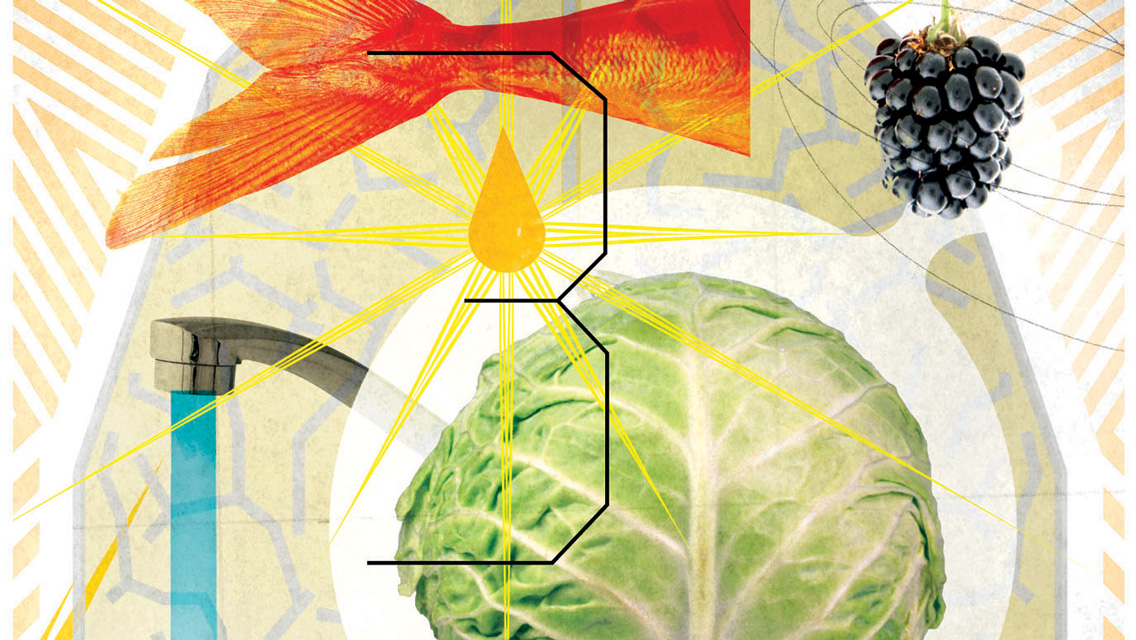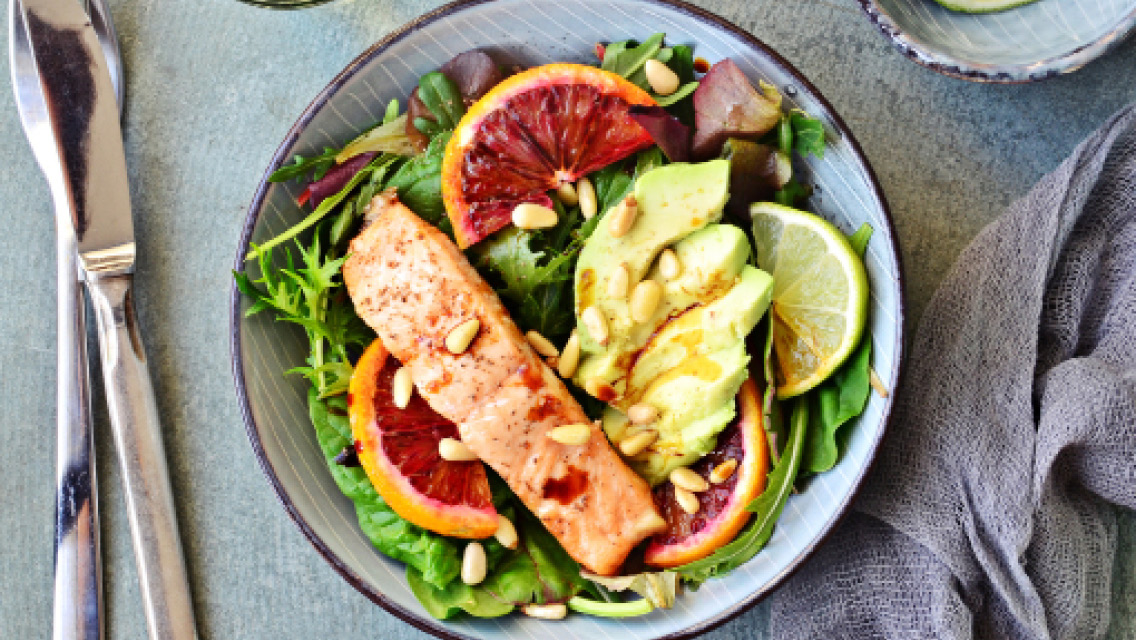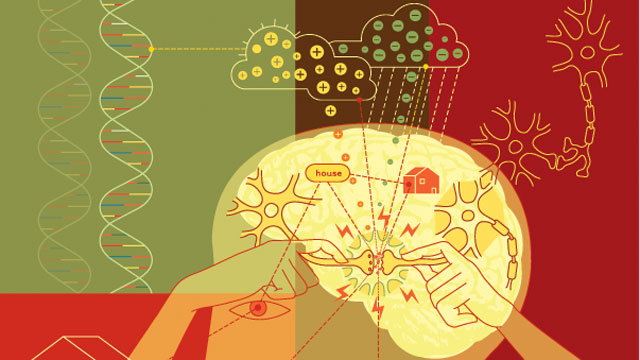While there are many positive aspects to aging, we’re more familiar with the things that can go wrong. For all the wisdom we gain from experience, we’re more apt to worry about memory loss. We fret over rusty neurotransmitters and cloudy thinking.
So we diligently do crossword puzzles, wrestle with brainteasers and learn to play musical instruments — for the intrinsic joy, of course, but also to help inoculate our brains against negative age-related changes. These are helpful pursuits, but they’re not the only ones that matter. In fact, if we want to build a better brain, what we choose to eat and drink might make the biggest difference of all.
The following food-based strategies can help any brain function better — whether that brain is 9 years old or 90.
Hydrate
Proper hydration is a critical factor in maintaining and improving your mind as you age. “Your brain is 80 percent water,” says Daniel Amen, MD, a clinical neuroscientist and author of Use Your Brain to Change Your Age: Secrets to Look, Feel, and Think Younger Every Day. “Even slight dehydration increases the body’s stress hormones, which can decrease your ability to think clearly. Over time, increased levels of stress hormones are associated with memory problems.”
While the amount of hydration you need day-to-day depends on several factors, including activity level, relative humidity and eating habits (to name only a few), the oft-repeated advice to drink 64 ounces — or eight 8-ounce glasses — of water a day isn’t a bad general rule to follow. Keep in mind, however, that you can account for those ounces in several different ways. If you’re eating a lot of vegetables and fruits, for example, you may need to drink less water. Most fresh plant foods have a high water content and will help keep you hydrated.
While the feeling of thirst is a good indicator you need to hydrate, if the only time you grab a glass of water is when you’re noticeably thirsty, you may not be drinking enough for optimal health. That’s because that “thirsty feeling” kicks in only when your body is already a bit dehydrated. The best approach to hydration is a conscious, proactive one. So, drink up! (For more on proper hydration, see “Drink to Your Health.”)
Fight Free Radicals
If you leave a bottle of wine open too long, it will oxidize and become stale. If your car is exposed to the elements for too long, its exterior may rust. Just as wine degrades and metal rusts, the cells in our brains and bodies degrade over time when they are exposed to free radicals.
Free radicals are unstable molecules that are generated in the body as a byproduct of other natural internal processes, such as the metabolizing of food or the triggering of an immune response by a bacteria or virus.
Free-radical molecules are unstable because they have an uneven number of electrons, which prefer to be in pairs. So in an effort to restabilize themselves, free radicals roam the body stealing electrons from healthy cells. When that happens, the formerly healthy cells, now short an electron, head out on their own searching for a replacement electron, thus inciting an unhealthy chain reaction of stolen electrons throughout the body. It is that cascade of “electron theft” that causes the cellular damage or “rust” in our brains and bodies.
Antioxidants are free-radical scavengers. They fight the corrosive effects of free radicals by quieting their search for additional electrons. You can build up your antioxidant power by eating more vegetables: Broccoli, cabbage, cauliflower, Brussels sprouts, spinach, kale and chard all pack a powerful punch in the fight against free-radical damage.
Garlic, too, is a powerful antioxidant, and it also has antibacterial and antifungal qualities. Fruit is another ally. Blueberries brim with antioxidants, as do raspberries, blackberries and strawberries. Red grapes contain high levels of the potent antioxidants resveratrol and quercetin. (So, too, by extension, does red wine; in moderation, it may offer some antioxidant protection.)
Spices and herbs are also powerful weapons in the fight against free radicals. Cumin, cloves, cinnamon, turmeric, mustard, ginger, oregano, basil, sage, thyme and tarragon are rife with antioxidants. Look for recipes that call for these, or add a dash of cinnamon, turmeric or ginger to a cup of tea. Green, white and black teas contain antioxidants, too, so by pairing tea with spices, you’ll get a double dose of antioxidant power.
Ditch Processed Foods
The vast majority of unhealthy, age-amplifying foods are processed foods. One of the main dangers of processed foods? Added sugar.
Each year, Americans consume an average of 150 pounds of sugar per person — much of it in processed foods, says Nancy Appleton, PhD, coauthor of Suicide by Sugar. And that is not good news for brain health.
Overconsumption of sugar has been linked to depression and dementia disorders such as Alzheimer’s. It also increases inflammation and raises insulin levels in a way that can suppress the immune system, increasing your vulnerability to a host of additional diseases of brain and body.
Remember, too, that high-glycemic carbohydrates (also called “simple carbs”), which proliferate in processed foods, act like sugar in the bloodstream.
Processed foods also contain more than their fair share of unhealthy fats. While the human brain needs healthy fats to function — such as those found in nuts, avocados, and coconut and olive oil — bad fats like trans fats and highly processed commercial vegetable oils have been linked to depression and other mood disorders. These fats interfere with the metabolism of essential fatty acids in brain-cell membranes, which can harm some of the neurotransmitters responsible for mood, focus and memory.
Boost Key Nutrients
Dietary supplements can play a key role in healthy brain functioning. Here are some of the top brain-boosting supplements:
- Vitamin D. Studies have shown that vitamin D can protect against dementia, a range of autoimmune disorders, cancer, high blood pressure and many other illnesses. Our bodies produce vitamin D in response to sunshine, but most people don’t get adequate daily sun exposure — especially if you live in a northern climate.
- Omega-3s. Daily supplementation with fish oil, one of the best sources of omega-3 fatty acids, can give your brain a big boost. High-quality fish oil, free from mercury and other toxins, provides the omega-3 fatty acids that sheath brain cells and facilitate healthy brain functioning. Omega-3s also help fight inflammation, which tends to occur in our brains as we age. Studies have shown that some of the other nutrients in fish oil, such as DHA and EPA, help provide protection against depression, stabilize mood and promote alertness.
- CoQ10. Short for coenzyme Q10, CoQ10 is a molecule that works in concert with other nutrients to improve the functioning of all the cells of the body. Many recent studies have linked CoQ10 with boosting overall energy and sharpening cognition. (For more on CoQ10, see “CoQ10: The Miracle Molecule.”)
One of the most common myths about aging is that memory inevitably declines. But I know from the growing body of scientific evidence that age-related decline in brain function isn’t a foregone conclusion. If you nurture your brain with the right nutrients, you will help it remain flexible, resilient and strong. So, next time you sit down for a meal or reach for a snack, think of your future brain, and choose wisely!




This Post Has 0 Comments